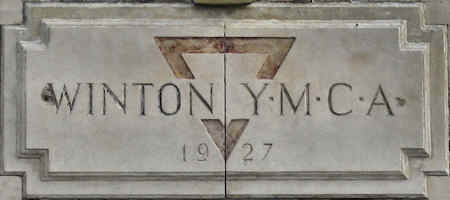|
From Hut to Hope
The story of the Winton YMCA
The YMCA had a presence in Winton from the early
1900's and played a big part in supporting soldiers during the
First World War.
Records for 1903 show a YMCA Mission Room located
at the Gospel Mission Hall between 14 and 16 Wycliffe Road.
The building on the corner of Cranmer Road currently
houses the Moose Hall.
In 1914 the YMCA moved to a purpose built hut next
to St Lukes Church. One of many set up in the area as recreation
centres for troops destined for the trenches of the Western Front,
it was closed down in 1916.
In 1920, a large wooden hut was moved from the Convalescent
Camp at Barton-on-Sea and repositioned on a rough bit of land
off Wimborne Road in what is now Jameson Road.
This was to be the headquarters of the Winton YMCA.
The plot of land incidentally, was part of the old
Winton Farm.
High Ideals
The hut was formally opened by Lady Malmesbury as
a place where "young men might, in an atmosphere of the right
kind, come together for social culture, physical training, educational
and religious development."
They seem to have had quite a good time, among other
things forming a forty-strong troupe of minstrels.
But the building was not quite up to the task. Whenever
it rained, water poured down from leaks in the roof and drenched
those unfortunate enough to be in the building below.
By 1926 they had had enough and it was decided to
build a modern replacement.
They raised the money by selling off part of the
plot on which the hut was sited.
New Home
Work on the current building in Jameson Road started
in 1927. As part of the area's only
Royal visit, the Prince of Wales stopped by to see how the
construction work was going.
The new YMCA building was officially opened in 1928
and rapidly became a popular venue.
A couple of hundred people would turn up for the
Sunday evening concerts and many others used facilities for reading,
writing, board games, meetings, debates, lectures and classes.
It became a haven for those in particular who had
fallen victim to the unemployment and deprivation often associated
with the 1930's.
Although a club for young men, it was largely run
by the women of the "Ladies Auxiliary".
With the outbreak of World War II, the Winton YMCA
suddenly found itself in even greater demand. In a matter of days
it was the temporary home for around 300 soldiers and the headquarters
for the Fire Service's Zone XI.
The billiard room became a dormitory for up to 30
firemen. Another unit of 500 soldiers were based at the building
in the winter of 1939/40. An official report describes how the
YMCA ladies "worked like trojans for the boys' comfort".
Evacuees
May and June 1940 brought the arrival of waves of
French and British troops who had escaped Dunkirk. The YMCA provided
everything "on the house" including clothes, baths,
teas and suppers.
Much of this was possible because of the generosity
of local people in Winton and Moordown.
With the beginning of the Blitz and several devastating
air raids, the YMCA building then became a rest centre for civilians
whose homes had been damaged or destroyed. At one point as many
as 500 were found beds and food in the building.
Next to arrive was a thousand strong unit of RAF
trainees. The building in effect became a transit camp with personnel
changing by the week.
YMCA helpers arranged football, cricket, snooker
and billiard matches and there were parties for wounded servicemen.
Transport was found to bring them to Winton from the hospitals
where they were being treated.
Throughout these difficult times the motto remained
"No request is ever refused".
Fund-raising
At the same time, funds were being raised for charities
like the Red Cross, Aid to China, Aid to Russia, Children's Nursing,
and Children's Welfare. And the civilian programme continued with
a schedule of sports events and socials.
They were so busy that in the "D-Day"
month of June 1944, 10,000 cups of tea were drunk on the premises!
During the 1939-45 war two hundred and thirty members
of the Winton YMCA served in the armed forces, and somehow Jameson
Road managed to keep in contact with many of them. By the end
of the war, ten had been killed in action.
Winton YMCA celebrated its 25th anniversary in April
1945 - just the end of the war in Europe. A week of events included
a Tea Rally, a visit from snooker champion Claude Faulkiner, a
Celebration Supper, a Workers Rally, a members-only visit to the
Moderne cinema, two Celebration dances, a tea for wounded servicemen
and a Grand Variety Concert by "Tip Top" Variety Party.
And a month later they would be dancing in the streets
for VE Day!
Keeping up with the times
The YMCA continued to reflect the changes in our
culture and the building is today as busy as ever.
Some of the Winton Community Forum meetings are
held there and it is also home to local Christian radio station
Hope FM.
Hope FM's speech to music balance is approximately
60/40 and the music style is Contemporary Christian. This is drawn
from the full spectrum of Christian music from Praise & Worship,
through the full range of styles like country, Middle of the Road,
mid-rock and youth styles to Black Gospel.
It describes itself as a community station, aiming
to serve the community by broadcasting important information such
as local news, weather, road reports and local events.
Its presenters, like the rest of the Hope FM team are all volunteers
who give of their own time to train and put together their shows
with the aim of being as professional as possible.

Visit
the YMCA web site
|